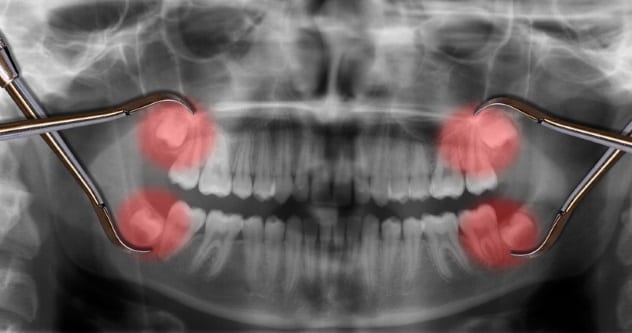 Weird Stuff
Weird Stuff  Weird Stuff
Weird Stuff  Mysteries
Mysteries 10 Tragic Disappearances and Deaths in Joshua Tree National Park
 History
History 10 Ways Childhood Really Sucked in the Old West
 Music
Music 10 Name Origins of Famous Bands from the 1990s
 Religion
Religion 10 Biggest Turnarounds by the Catholic Church
 Weird Stuff
Weird Stuff 10 Unbelievable Times Laws Had Unintended Consequences
 Humans
Humans Ten Historic Women Who Deserve Way More Credit Than They Got
 Movies and TV
Movies and TV 10 Films That Spawned Major Lawsuits
 History
History Ten Times Towns Were Wiped Off the Face of the Earth
 Creepy
Creepy 10 of the Most Disturbingly Haunted Public Houses in the UK
 Weird Stuff
Weird Stuff 10 Niche Subcultures That Are More Popular Than You Might Think
 Mysteries
Mysteries 10 Tragic Disappearances and Deaths in Joshua Tree National Park
 History
History 10 Ways Childhood Really Sucked in the Old West
Who's Behind Listverse?

Jamie Frater
Head Editor
Jamie founded Listverse due to an insatiable desire to share fascinating, obscure, and bizarre facts. He has been a guest speaker on numerous national radio and television stations and is a five time published author.
More About Us Music
Music 10 Name Origins of Famous Bands from the 1990s
 Religion
Religion 10 Biggest Turnarounds by the Catholic Church
 Weird Stuff
Weird Stuff 10 Unbelievable Times Laws Had Unintended Consequences
 Humans
Humans Ten Historic Women Who Deserve Way More Credit Than They Got
 Movies and TV
Movies and TV 10 Films That Spawned Major Lawsuits
 History
History Ten Times Towns Were Wiped Off the Face of the Earth
 Creepy
Creepy 10 of the Most Disturbingly Haunted Public Houses in the UK
10 Evolutionary Advantages Of Seemingly Weird Body Functions
The human body is a marvel of evolutionary engineering, seemingly equipped to counter every roadblock nature dares to throw our way. Most of our body functions have gone through millennia of trial and error to be like they are, but we’re not here to talk about them.
We’re more interested in the weird functions that seemingly serve no explainable purpose at all. Yet, they’re sure to have had some kind of advantage in our evolutionary history to have survived for so long, even if the reasons may not be as clear to us. We’re talking about functions like:
10 Depression

While many people tend to equate just having a bad day with depression, it’s really not the same. The statistics speak for themselves; about 300 million people worldwide suffer from depression, about 800,000 die of suicides, and a vast number of the rest have difficulty functioning as a consistent part of their lives, proving that it’s a serious problem. For all the ways depression hampers life on Earth, it’s hard to imagine how it survived evolution.
According to many scientists, though, it makes perfect sense. Researchers found a correlation between the genes that carry over with depression and those that help protect the body from pathogens that could harm us, which could explain why it carried over to the modern age.[1] Not just that, but the symptoms associated with depression—like social withdrawal and exhaustion—also helped the body reduce the chances of catching a particularly nasty disease by partially shutting down, which would make perfect sense in the pathogen-ridden, prone-to-disease environment that was our early history.
9 Weak Feet

Looking at our feet, we can’t help but think that something may have gone very wrong for them to be the way they are. Think about it; the human foot has 26 bones and is able to twist and turn like most other body parts can’t, though the thing is that it really doesn’t need to. All it needs to do is be sturdy and provide support to the frame while walking, but because of its intricate build, we regularly twist and and mess it up, something it shouldn’t even have the mechanism to do. So what gives?
Bipedalism.[2] Yup, our ability to walk on two feet didn’t just free our hands to make tools and conquer the world, it also took away our feet’s ability to act as secondary limbs, almost as capable as hands in providing us with the agility and maneuverability to navigate our four-legged lifestyles. While we don’t need all those bones and muscles anymore, evolution just decided to let them stay as they weren’t exactly doing much harm, except for setting ourselves up for regular instances of ankle-twisting and sprains.
8 Pubic Hair

One of the most enduring mysteries of human evolution, pubic hair really doesn’t make sense. While we know it has something to do with testosterone and estrogen—i.e. hormones related to sexuality—as it only shows up during puberty, we really have no idea why it exists. Not just that, but most of us actively take steps to get rid of it as a part of our grooming routines, meaning that it doesn’t just not make sense but is also unwanted. How did evolution let something like that slip by?
According to some scientists, there are perfectly good reasons for it. For one, because pubic hair shows up during puberty, it signals sexual maturity and also helps trap crucial pheromones that could potentially attract a mate. It makes sense, as in the pre-clothes era, pubic hair would stand out on an otherwise hairless body, telling whoever’s looking that you’re ready for business.
Another theory suggests that it’s there to reduce friction while having sex, as skin rubbing against other people’s skin may have led us to develop unwanted rashes and other irritating skin allergies that would hamper our chances at getting more sexual partners.[3]
7 Nails On Chalkboard

Ever heard the sound of nails scratching on the chalkboard and felt like someone was out to rip your head apart? Humans are almost unanimously averse to sounds similar to it, like that of a sharp stone on glass, chalk on slate, or a marker on a whiteboard. Evolutionarily speaking, how our bodies react to them doesn’t make a lot of sense—unless our hunter-gatherer history had a lot of whiteboards or slates, these sounds shouldn’t make us feel anything at all.
According to scientists, though, there are some perfectly good explanations for it. For one, the frequency range these sounds fall in, 2,000–5,000 hertz, also contains frequencies similar to that of a crying baby or a screaming person, which indicates that we developed these reactions as a defense mechanism against something dangerous approaching in our wild hunter-gatherer days.[4] Another study found that the part of the brain that deals with sound engages with the part that processes negative emotions as soon as any of these sounds are heard. The activity between the two regions also notched up as the sounds got more severe, proving that even though we have no need for this reflex reaction anymore, it made perfect sense back then.
6 Wisdom Teeth

Most people who have teeth—which is just about everyone—have had to come to terms with the painful experience of their wisdom tooth or teeth (as it’s different for everyone) growing out at least once in their life. For those who haven’t, we congratulate you for your luck, but for the other unlucky ones, it’s not the best of experiences. It’s especially bad because they serve seemingly no purpose whatsoever and only end up adding more things in our mouth that could get infected with cavities or such later in life. Most people get them taken out before that happens, but have you ever wondered why they even exist?
The answer is diet. In the old days, our diet comprised all kinds of stuff, like leaves, raw meat, and branches, so our jaw used to be much bigger than what we have today. The wisdom teeth helped us manage our wildly diverse diet, and the bigger jaw made room for the extra set of teeth. Through the years, though, the jaw shrank to accommodate more . . . civilized eating habits, though the wisdom teeth never got the memo.[5] That’s the reason most of us will make at least one visit in our life to a dentist to deal with a wisdom tooth, and you’ve got our ancestors’ way of eating to thank for it.
5 Dangling Testicles

The male reproductive system isn’t as complicated as that of the female, though one part of it has had scientists scratching their heads ever since they started thinking about it. Why do the testicles hang outside like that, given that they’re the most important organs on the list of “things evolution should have protected?” Most animals don’t have it the same, and the ones who do are also our immediate cousins or ancestors (aka mammals). At what point in our evolutionary tree did we decide that putting the sperm in an unprotected sack outside the body was a good idea?
Many theories exist, some of them more convincing than the others. For one, some believe that it’s due to the “handicapping principle,” which suggests that potential mates find the fact that someone who can survive with such a huge evolutionary disadvantage must be someone to definitely mate with, though we feel that may not be it. Another one, which makes much more sense, argues that the reason is protection. Testicles are only found to be outside in the mammals that do a lot of running and exertion—stuff that could cause abdominal pressure and a threat to sperm—so it seems more like an evolutionary mechanism to protect them by keeping them outside, which made more room for all the fun running from the predators we used to do in our early days.[6]
4 Tickling

When it comes to weird body functions, tickling has got to be pretty high on the list. While scientists don’t yet understand the kind of laughter due to tickling, they understand that it shouldn’t be a function. There have been times in history it has been a downright disadvantage, too, like those times when medieval warriors were reported to have tickle-tortured victims to death. It doesn’t seem to serve any purpose, and yet evolution wasn’t able to “take care of it” through the years.
According to some researchers, it isn’t that weird of a function. You see, the body parts most sensitive to tickling are also the ones most exposed in combat. They theorize that tickling our children was our involuntary way of teaching them how to protect their most vital organs, as the response to tickling among most of us is still defending the body.[7]
3 Fainting At The Sight Of Blood

This one may not be as commonly occurring, but it still happens enough that it raises some pretty big how-did-this-survive-evolution alarms. Many people are known to faint at the sight of blood, and thinking of it in evolutionary terms, that should have strictly been a no-no back in our violent early days. Think about it; what benefit could lying down unconscious have in a pitched battle where blood is flowing everywhere? If anything, our brains should get more alert to actively react to danger in those situations. So why don’t they?
It actually makes perfect sense, if you consider the things that go on in the body at the time of that fainting. It even has a medical name—vasovagal syncope—which refers to fainting at extreme triggers, like the sight of blood or trauma. When the body does that, it lowers the blood pressure and generally deactivates itself so that all the resources can go to keeping the brain alive.[8] Moreover, if you’re also bleeding from the threat that made you see the blood in the first place, the body’s slowed functions can decelerate that blood loss, acting as a safety mechanism for you to stay alive longer.
2 Acne

Most people who go through adolescence experience acne. Its effects can be debilitating for some, though they’ve got to realize that they’re not alone. Not only kids but a significant number of adults also exhibit acne, and we just cannot imagine how blobs of red matter on the face could have any evolutionary benefit. In fact, it should have been actively stubbed out by natural selection, suggesting that we got lazy on this one.
According to scientists, though, it isn’t as weird. A lot of blame for acne can be attributed to the evolutionary decision to go hairless. While we lost our fur pretty hastily, we couldn’t get rid of the glands just underneath the surface of the skin—the sebaceous glands—as fast. They served a function back then, which is to oil the fur and keep it . . . furry. Now that there’s no fur, those oils just clog up our face and cause acne.[9] Another theory suggests that it’s an indicator of whether someone is adult enough to have a family, which we could get behind, too.
1 Colorblindness

When it comes to common and weird disorders that are surprisingly prevalent in all populations, colorblindness takes the cake. It’s also pretty weird from an evolutionary perspective; why would an inability to recognize a venomous snake from a tree branch have survived natural selection? Its distribution is also unevenly spread among men and women, deepening the mystery. Compared to the one in 12 men who have it, one in 200 women suffer from colorblindness. It’s also one of the few anomalies on this list we can certainly say survived evolution, as the leading cause of colorblindness is hereditary.[10]
While we don’t intuitively think it’s a good thing, colorblindness may actually have been a definite advantage in some situations. The condition frees the individual from seeing the colors in favor of patterns, and that would have given them an edge over their less colorblind peers in spotting camouflaged predators. In fact, colorblind forces were used in World War II to spot camouflaged positions to great success.
Himanshu can be found shouting obscenities at strangers on Twitter or making amateur drawings on Instagram. Has written for Forbes, Cracked, Screen Rant, and Modern Rogue, among others. Pay him money for writing stuff for you here.
Read more about our amazing bodies on 10 Questions We Can’t Answer About The Human Body and 10 ‘Facts’ About The Human Body That Are Completely False.








